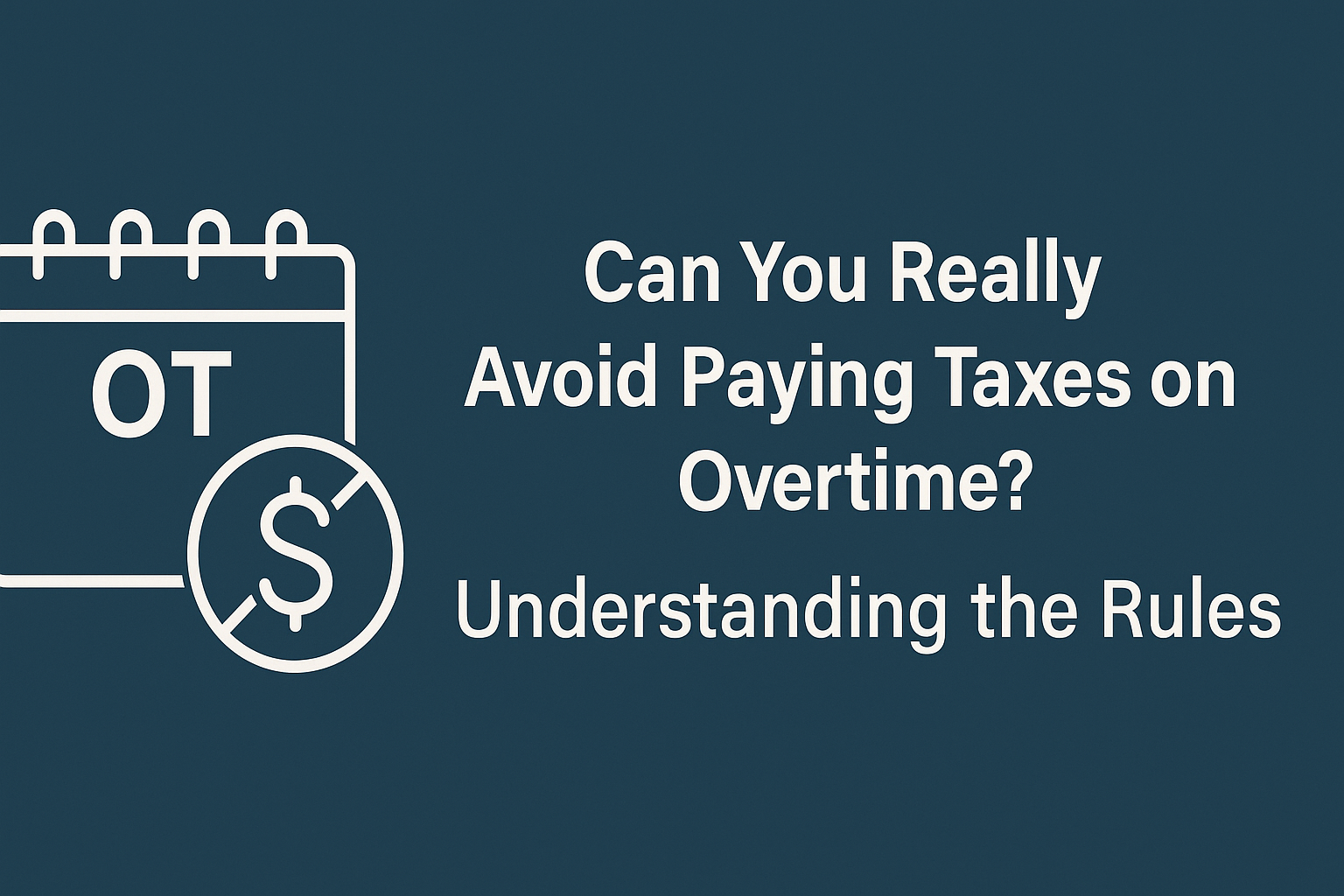
No Tax on Overtime?
If you’ve ever seen headlines, TikToks, or forum posts claiming there's “no tax on overtime”, you’re not alone. It’s one of the most common misconceptions floating around tax season. The reality? Overtime is taxable income, and misunderstanding how it works could leave you with a surprise tax bill—or missed opportunities for a bigger refund.
This article breaks down how federal income tax applies to overtime, how it affects your tax refund status, and what strategies you can use to manage overtime pay more efficiently.
How Overtime is Taxed: The Basics
What Counts as Overtime?
According to the Fair Labor Standards Act (FLSA), overtime is typically any hours worked beyond 40 in a single workweek. Employees must be paid at least 1.5 times their regular hourly rate for overtime hours.
Is Overtime Tax-Free?
No. Overtime pay is taxed the same way as your regular wages. It’s added to your gross income and subject to:
- Federal income tax
- State and local income taxes (where applicable)
- Social Security tax (6.2%)
- Medicare tax (1.45%)
If you’re earning a significant amount of overtime, it may bump your marginal tax rate, which could reduce your take-home pay more than expected—but it doesn’t mean you're in a “higher tax bracket” overall.
How Overtime Affects Federal Income Tax
Understanding Tax Brackets
The U.S. uses a progressive tax system. This means you’re only taxed at higher rates on the portion of your income that exceeds each bracket’s threshold.
Let’s say you earn $60,000 annually and take on extra shifts that push you to $70,000. Only the $10,000 in additional income is taxed at the higher marginal rate—not your entire salary.
📌 Pro Tip: If you regularly earn overtime, it’s wise to increase your tax withholding to avoid surprises come tax season.
Overtime and Your Tax Refund Status
Many employees assume that overtime will give them a bigger refund. While that can be true, it depends on how much was withheld throughout the year versus your total tax liability.
Here's How Overtime Can Impact Your Refund:
- More income, same withholding: May result in a tax bill.
- More income, more withholding: Could result in a larger refund.
- Too much withholding: Could unnecessarily reduce your paychecks.
💡 Use the IRS Withholding Estimator to ensure you're on track, especially if overtime shifts are regular.
Common Myths About Overtime Taxation
Myth 1: “I lose money when I work overtime.”
Truth: While a larger portion of overtime pay may be taxed at a higher rate, you still take home more money overall.
Myth 2: “Overtime pushes me into a higher tax bracket—so it’s not worth it.”
Truth: It only affects the additional earnings, not your entire salary.
Myth 3: “I won’t get a refund if I earn too much.”
Truth: Refunds are based on how much tax you paid vs. how much you owe. More income can still result in a refund if you had proper withholding.
Bullet-Point Comparison: Overtime vs. Regular Pay
Regular Pay
- Based on 40 hours/week
- Taxed at your effective tax rate
- Predictable withholding and paycheck amounts
Overtime Pay
- Paid at 1.5x hourly wage
- Taxed at the same federal and state rates
- May push part of income into a higher tax bracket
- Can impact your refund if withholding isn’t adjusted
Strategies to Optimize Overtime and Tax Planning
1. Adjust Your Withholding
Update your W-4 form if your income increases consistently with overtime. This can prevent underpayment penalties and help balance your refund.
2. Contribute to Tax-Advantaged Accounts
Use overtime earnings to contribute to:
- A Traditional IRA or 401(k) to reduce taxable income
- A Health Savings Account (HSA) for medical expenses
- A 529 Plan for future education expenses
3. Track Overtime Separately
Use tools or apps to log your overtime hours and associated pay. This can help you forecast your year-end income and tax bill more accurately.
4. Consult a Tax Professional
If your income fluctuates or overtime becomes a major part of your salary, working with a CPA or tax advisor can help optimize your withholding strategy.
FAQs About Overtime and Taxation
Does my employer take more taxes out of my overtime?
Not exactly. Your employer withholds based on your income level and pay period, so it may look higher because you’re earning more—but the rate remains consistent.
Will overtime hurt my eligibility for tax credits?
Possibly. Extra income could phase you out of certain tax credits like the Earned Income Tax Credit (EITC). Check the IRS income limits each year.
Can I avoid taxes on overtime if I get paid in a bonus instead?
No. Bonuses are also considered taxable income, and in many cases, taxed at a higher flat rate.
Make Overtime Work for You—Not Against You
The idea that there’s “no tax on overtime” is a myth. But that doesn’t mean overtime isn’t worth your time. Understanding how it affects your federal income tax, planning your withholding, and using smart strategies can help you keep more of what you earn and even increase your tax refund status in the process.
Need Help Managing Income Spikes or Planning for a Bigger Refund?
Schedule a free call with the BetterWealth team to review your tax strategy and build a smarter financial future—overtime and all.





